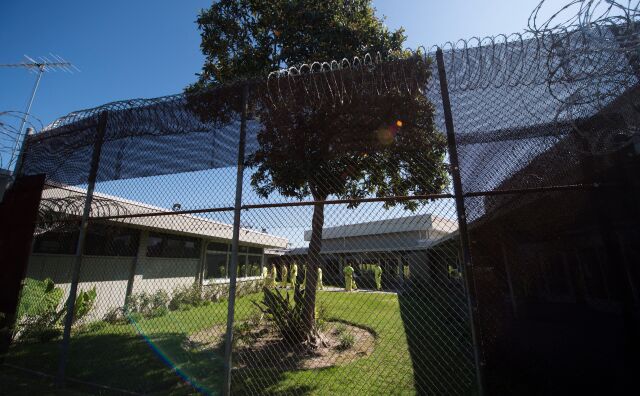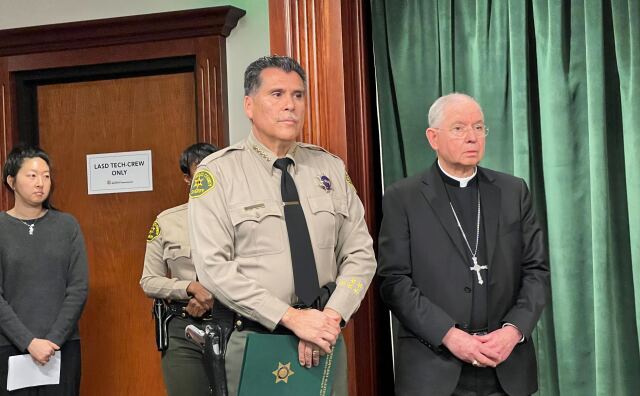When Los Angeles District Attorney George Gascón took office a year ago, he directed the county’s nearly 1,000 prosecutors to decline charges involving 13 categories of low-level misdemeanors, including driving on a suspended license, drug and paraphernalia possession, and public intoxication.
The sweeping new policy called for misdemeanor charges only when there are extenuating circumstances, like repeat offenses.
An LAist review of millions of criminal cases found that the reform, dubbed Special Directive 20-07, has led to a dramatic decline in the rate at which the DA charges misdemeanors. In cases covered by the special directive, prosecutors filed charges just 13% of the time. During former District Attorney Jackie Lacey’s second term, those types of cases were charged 89% of the time, according to our analysis.
-
We're taking a closer look at how L.A. County District Attorney George Gascón has pulled back from seeking longer sentences for more serious crimes and stopped filing charges for certain low-level misdemeanors.
In all, the DA’s office declined to file charges in more than 38,000 misdemeanor cases involving the offenses listed in the special directive between Dec. 7, 2020 and early Nov. 2021.
The special directive is among several policies Gascón has introduced — he also curtailed sentencing enhancements and barred deputy district attorneys from attending parole hearings — meant to deliver on his campaign promise to combat mass incarceration and systemic racism in the criminal justice system.

Progressive academics and community groups say the changes are necessary to address a bloated and unequal criminal justice system, and that low-level criminal charges affect thousands of Angelenos as well as their families and communities.
"The record of the misdemeanor arrest can haunt a person for life,” said Harvard law professor Alexandra Natapoff, the author of the book "Punishment Without Crime: How Our Massive Misdemeanor System Traps the Innocent and Makes America More Unequal."
People accused of misdemeanors in California are typically arrested or given a citation. If found guilty, a defendant can face a sentence of up to one year in jail and a fine of $1,000.

“It can ruin their credit, it can disable their ability to get a job, or a loan, or housing,” Natapoff said. “There’s a whole world of consequences that far outstrip the seriousness of the underlying offense.”
But Gascón’s approach has also provoked a furious backlash from some prosecutors and elected officials who advocate for a more traditional, tough-on-crime approach. They argue the directive gives people a license to commit low-level crimes with impunity, at a time when violent crime has been climbing from historic lows.
“Gascón, in his misguided attempt to change the justice system, has taken valuable tools away from law enforcement officers,” said former L.A. County DA Steve Cooley. “He has created a situation where neighborhoods will deteriorate.”
A ‘Surgical’ Approach
As an LAPD officer decades ago, Gascón supported prosecuting misdemeanors and other tough-on-crime policies. “That was the thinking that we all had in the 80s and 90s,” he told LAist in a recent interview.
As he became the Chief of Police in Mesa, Arizona and later the DA in San Francisco, Gascón turned into an outspoken critic of the war on drugs, a belief he brought with him when he returned to Los Angeles to lead the largest local prosecutor’s office in the nation.
Calling the crimes in the special directive “very low-level” misdemeanors, Gascón said prosecutions in those cases “actually create more insecurity and more harm than create any safety."
We clog the court system, and we take resources away from dealing with serious, violent crime.
He added that a glut of lower-level misdemeanors distracts prosecutors from their most important cases. “We clog the court system, and we take resources away from dealing with serious, violent crime," he said. The DA calls the special directive a more “surgical” approach to the job of a prosecutor, pushing staff to be more deliberate in which cases are charged.
Felonies and other categories of misdemeanors are not covered by Gascón’s special directive, and changes in their rates have been less pronounced, according to LAist’s analysis.
The reform is meant to reduce prosecutions of vulnerable people, including those experiencing homelessness, because L.A. County courts, “should not be revolving doors for those in need of treatment and services,” according to the directive. It says nearly half the people incarcerated pre-trial in misdemeanor cases have a mental illness, and a majority have substance abuse issues.

To buttress his argument, Gascón cited a recent study in Suffolk County, Massachusetts. Documented in a working paper released this year through the National Bureau of Economic Research, the research found that when prosecutors reject non-violent misdemeanor charges, it “leads to large reductions in the likelihood of a new criminal complaint [against the same individual] over the next two years.” The academics wrote that the reductions were between 33% and 70%.
The study reviewed over 67,000 Suffolk County cases from January 2004 to September 2018, comparing the outcomes of defendants whose low-level misdemeanors were prosecuted with those who were not charged.
Misdemeanor charges are “acting like a dead weight on defendants,” according to Anna Harvey, a New York University researcher who co-authored the study. Harvey said that prosecutors opting not to file charges for some misdemeanors had, “a pretty beneficial effect on public safety” in Suffolk County, and that she expects Gascón’s policy will produce similar results in L.A. County. Both Harvey and Harvard’s Natapoff are communicating with Gascón’s office.
Misdemeanor charges are “acting like a dead weight on defendants.”
While the directive does not specifically mention race, the DA argues the changes will help address the massive and longstanding racial disparities in the criminal justice system.
Currently, 29% of people in L.A. County jails are Black, according to the Sheriff’s Department. The county is 8% Black. The jail population is 55% Latino, while L.A. County as a whole is 49% Latino.
How the dramatic decline in misdemeanor charges breaks down in terms of the demographics of those facing charges is not yet clear. The vast majority of data LAist reviewed on criminal charges and declinations does not include the race of the defendant, information the DA only began to collect in August 2021.
Kent Mendoza, an organizer with the Anti-Recidivism Coalition, which works with formerly incarcerated Californians, said he sees the effects of criminal charges on communities of color on a daily basis. Barriers to jobs and housing are first among them, he said.
Mendoza also agreed that the stresses of a criminal case, possible jail time, and fines and court fees can fuel additional charges down the road. “It starts affecting other parts of your life,” he said.

Melina Abdullah of Black Lives Matter-Los Angeles backs Gascón’s misdemeanor policy. “We know that the prosecution of low-level misdemeanors does not in fact reduce crime,” she said. “What it does is feed a system of mass incarceration, a system of jails, and a system of policing that targets Black, Brown and poor folks.”
The special directive also affects public defenders, who represent many misdemeanor defendants and say the shift has made their caseloads more manageable.
"It just makes the courtroom so much more efficient,” said Molly Zavidow, a public defender and member of Los Angeles County Public Defenders Union Local 148.
‘His Directives Suck’
The DA prosecutes misdemeanors in unincorporated areas and 78 L.A. County cities. In several populous cities, including Los Angeles, Long Beach and Torrance, local city attorneys, and not the DA, prosecute misdemeanors and municipal code violations. The special directive does not apply to those offices.
But several local elected officials from cities within the DA’s jurisdiction have attacked the changes, and over two dozen cities have taken symbolic votes of “no confidence” in Gascón. Many cited the misdemeanor policy.
“It's for the criminals, not for the victims."
One is West Covina, where at a June council meeting councilmember Letty Lopez-Viado was blunt: “We’re pretty much saying his directives suck.”
Lopez-Viado singled out Special Directive 20-07 for criticism in an interview. “It's for the criminals, not for the victims,” she said. She was frustrated that so few misdemeanors are being prosecuted, and had been fielding calls and emails from angry residents about issues like trespassing.
“There’s no punishment, there’s no consequences,” Lopez-Viado said, adding that many of her constituents think the police department isn’t doing its job.

In Glendale, where the DA has declined to file misdemeanor charges in at least 825 cases, the new policy sparked concerns over access to substance abuse treatment, and the decline of officer morale at an August council meeting. In Downey, nearly 90% of misdemeanor narcotics cases were rejected, and a police captain told the city council that officers would continue to make arrests regardless of whether prosecutors pursue the cases.
The Association of Deputy District Attorneys, the union that represents the nearly 1,000 prosecutors in the DA’s office, has fought several of Gascón’s changes over the past year.
In a lawsuit filed just weeks after Gascón took office, the union’s attorneys called changes curtailing the use of sentencing enhancements “not merely radical, but plainly unlawful.” In October, the group filed another lawsuit accusing Gascón of “filling the civil service ranks with political loyalists and financial supporters,” by appointing former public defenders to deputy district attorney positions.
The union’s vice president Eric Siddall took a more measured tone in an interview about the misdemeanor special directive, which does not feature in either lawsuit. Siddall said Gascón’s changes strip away prosecutors’ discretion to make judgement calls on trespassing, public intoxication and other misdemeanor cases. The directive “removes our legitimate place in terms of enforcing the laws that a lot of members of the community want enforced,” Siddall told LAist.
“Will it impact quality of life issues for residents of Los Angeles County? Absolutely,” he said.
Some of Gascón’s critics misrepresent the policy. The website of an unsuccessful, yet reinvigorated effort to recall Gascón falsely asserts that his office “never files misdemeanor criminal threats, disturbing the peace, trespass, or resisting arrest, ever.”
That’s wrong. The data LAist reviewed shows the DA filed misdemeanor charges in nearly 6,000 cases covered by the special directive in the first eleven months of Gascón’s term. They included hundreds of allegations of misdemeanor criminal threats, trespass and resisting arrest.
-
In December 2020, Sadie and Eddie Martinez were falsely accused of attempted kidnapping by a white woman who had been shopping at a Michaels craft store at the same time as them. This is the story of Sadie's fight to clear their names and bring her accuser to justice.
-
An Orange County public defender has tallied 57 tainted criminal cases stemming from the county's informant scandal. New revelations of alleged misconduct could affect dozens more.
-
Ryan Clinkunbroomer was found in his patrol car near the Palmdale station. He was a third-generation sheriff's deputy.
-
L.A. County prosecutors say David Bloom scammed nine people out of nearly $250,000. Bloom, a twice-convicted con man known in the ‘80s as the “Wall Street Whiz Kid,” allegedly trolled for victims in a Hollywood apartment building and local bars.
-
Edward Bronstein died in March 2020 while officers were forcibly taking a blood sample after his detention.
-











